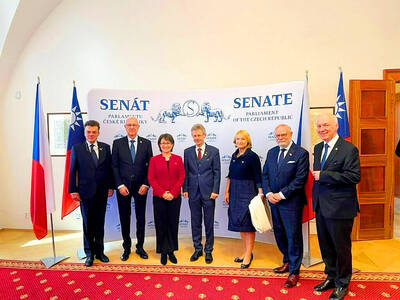The Executive Yuan yesterday approved a multibillion-dollar project to develop the biomedical industry through a tax incentive scheme to increase innovation and export medical services to the world.
The project, which is part of President Tsai Ing-wen’s (蔡英文) campaign pledge to develop the “five plus two” innovative industries, aims to relax investment and recruitment regulations to lure and retain foreign capital and talent, and to encourage local businesses to acquire international companies and develop foreign markets, Executive Yuan spokesman Hsu Kuo-yung (徐國勇) said.
The government is to invest NT$10.94 billion (US$346.32 million) in the next year to develop 10 large-scale healthcare firms, 20 new drugs and 80 new medical devices to be marketed internationally by 2025 in a bid to boost the annual value of the biomedical industry to NT$1 trillion, Ministry of Science and Technology Department of Life Sciences Director-General Tsai Shaw-jenq (蔡少正) said.

Photo: CNA
The ministry is to build a “biomedical corridor” connecting the nation’s science parks to maximize research capabilities, he said.
“The nation’s medical service is the best in Asia and the third best in the world, and we want to export the service by completing the infrastructure of the healthcare industry,” Tsai Shaw-jenq said.
The government is looking to tap into the global senior healthcare market, especially in Southeast Asia, while developing specialized medical therapies for diseases that people of Chinese ethnicity are prone to develop.
The program will also exempt biomedical start-ups from taxation in the early stages after an initial public offering, while restrictions that prohibit academics from assuming positions in private companies will be lifted to encourage university spin-off companies, Minister of Science and Technology Yang Hung-duen (楊弘敦) said.
The Executive Yuan also passed an amendment to the Act for the Development of Biotech and New Pharmaceuticals Industry (生技新藥產業發展條例) to provide tax incentives to companies as part of the development package.
The new incentive scheme allows a 35 to 50 percent tax credit on a company’s research and development expenses and personnel training cost. Shareholders are also to receive a 20 percent tax credit on the investment amount, or the purchase price of the stock, Vice Minister of Economic Affairs Shen Jong-chin (沈榮津) said.
“This is special legislation and it is the only legislation that offers a tax incentive scheme,” Shen said, adding that the act, even without the amendment, already saw investment in the biotechnology sector increase to NT$48.4 billion last year.
The amendment will also lift restrictions on the development and production of high-risk medical devices and new drugs to prompt manufacturers to develop such products, as current legislation lags behind technological advancement, Shen said.
The move will benefit about 50 medical instrument and 13 regenerative medicine firms in the fields of precision medicine, gene therapy and cell therapy, he added.

FREEDOM OF NAVIGATION: The UK would continue to reinforce ties with Taiwan ‘in a wide range of areas’ as a part of a ‘strong unofficial relationship,’ a paper said The UK plans to conduct more freedom of navigation operations in the Taiwan Strait and the South China Sea, British Secretary of State for Foreign, Commonwealth and Development Affairs David Lammy told the British House of Commons on Tuesday. British Member of Parliament Desmond Swayne said that the Royal Navy’s HMS Spey had passed through the Taiwan Strait “in pursuit of vital international freedom of navigation in the South China Sea.” Swayne asked Lammy whether he agreed that it was “proper and lawful” to do so, and if the UK would continue to carry out similar operations. Lammy replied “yes” to both questions. The

Two US House of Representatives committees yesterday condemned China’s attempt to orchestrate a crash involving Vice President Hsiao Bi-khim’s (蕭美琴) car when she visited the Czech Republic last year as vice president-elect. Czech local media in March last year reported that a Chinese diplomat had run a red light while following Hsiao’s car from the airport, and Czech intelligence last week told local media that Chinese diplomats and agents had also planned to stage a demonstrative car collision. Hsiao on Saturday shared a Reuters news report on the incident through her account on social media platform X and wrote: “I

SHIFT PRIORITIES: The US should first help Taiwan respond to actions China is already taking, instead of focusing too heavily on deterring a large-scale invasion, an expert said US Air Force leaders on Thursday voiced concerns about the Chinese People’s Liberation Army’s (PLA) missile capabilities and its development of a “kill web,” and said that the US Department of Defense’s budget request for next year prioritizes bolstering defenses in the Indo-Pacific region due to the increasing threat posed by China. US experts said that a full-scale Chinese invasion of Taiwan is risky and unlikely, with Beijing more likely to pursue coercive tactics such as political warfare or blockades to achieve its goals. Senior air force and US Space Force leaders, including US Secretary of the Air Force Troy Meink and

Czech officials have confirmed that Chinese agents surveilled Vice President Hsiao Bi-khim (蕭美琴) during her visit to Prague in March 2024 and planned a collision with her car as part of an “unprecedented” provocation by Beijing in Europe. Czech Military Intelligence learned that their Chinese counterparts attempted to create conditions to carry out a demonstrative incident involving Hsiao, which “did not go beyond the preparation stage,” agency director Petr Bartovsky told Czech Radio in a report yesterday. In addition, a Chinese diplomat ran a red light to maintain surveillance of the Taiwanese